Cloud security is a set of measures enforced in cloud platforms to secure them from external threats and attacks. They have to be integration-friendly for seamless cloud security. One such vital software for cloud security is the cloud firewall, a cloud-native solution that acts as a barrier between external and internal cloud network traffic.
79% of organizations find cloud security to be a primary challenge. Data breaches and exposure in cloud environments are becoming increasingly common despite deploying various security tools. Inconsistencies in the cloud security configurations have led to over 69% of companies facing data breaches.
The article discusses the benefits, limitations, top choices, and various functions of cloud firewalls such as:
- Traffic Analysis
- Packet Filtering
- Stateful Inspection
- Intrusion Detection & Prevention
- Logging & Monitoring
- Threat Intelligence
- Access Management
What Is A Cloud Firewall?
Cloud firewall is a cloud security product that provides protection by monitoring, blocking, and filtering out malicious ingoing and outgoing network traffic. Since this type of firewall is delivered and used via the cloud, it is also known as a firewall-as-a-service (FaaS).
Cloud-based firewall forms a barrier around the cloud platform and its components (resources, applications, networks) similar to how a traditional firewall works by creating a barrier around the internal and untrusted external networks as well.
How Do Cloud Firewalls Function?
Cloud firewalls filter authorized and unauthorized communication by monitoring internal and external network traffic of the cloud platform. The following are step-by-step functions of a typical firewall for cloud app security:
Traffic Analysis
It is the continuous scanning of incoming and outgoing network traffic within a cloud platform. It is a passive approach to security where cloud network traffic is monitored to detect and identify patterns, anomalies, and potential security threats.
It does not however filter the traffic but rather helps in the detection of unusual network activity and provides insights into the network behaviour.
Packet Filtering
Cloud firewall functions with a set of defined rules. These rules are based on IP addresses, port numbers, & protocols. Data packets containing small amounts of information are filtered using the firewall’s rules.
Packets that match an authorized rule are allowed to pass through but ones that match certain threat rules are blocked by the firewall from the network. It does not keep track of the state of connections and is a static approach.
Stateful Inspection
Stateful inspection is a dynamic approach that keeps track of active network connections, and filters packets based on the context of traffic. It provides a higher level of security based on intelligent decisions.
Decisions are influenced by a database that is maintained to track all open connections and check existing traffic flows. It stores information on the source and destination IP and port for each active connection.
Intrusion Detection & Prevention
Some cloud firewalls integrate IDPS systems to scan and analyze network traffic patterns to identify potential threats.
Detection of suspicious network traffic results in the firewall blocking and mitigating the threat in real time.
Logging and Monitoring
Logs of network traffic and security events of a cloud firewall are vital in tracking and investigating security concerns and incidents.
Administrators can review cloud firewall network logs to detect & identify any patterns, anomalies, or potential breaches.
Threat Intelligence
Cloud-based firewalls often also have some form of threat intelligence that can provide real-time information on potential & emerging threats.
This lets the firewall be dynamic in its continuous updation of the rules to better protect against new threats.
Access Management
Another crucial integration seen with cloud firewalls that enhances their performance is access management.
Identity and access management (IAM) is used to enforce rules based on identities, roles, and permissions.
5 Popular Cloud Firewalls
1. Astra Firewall
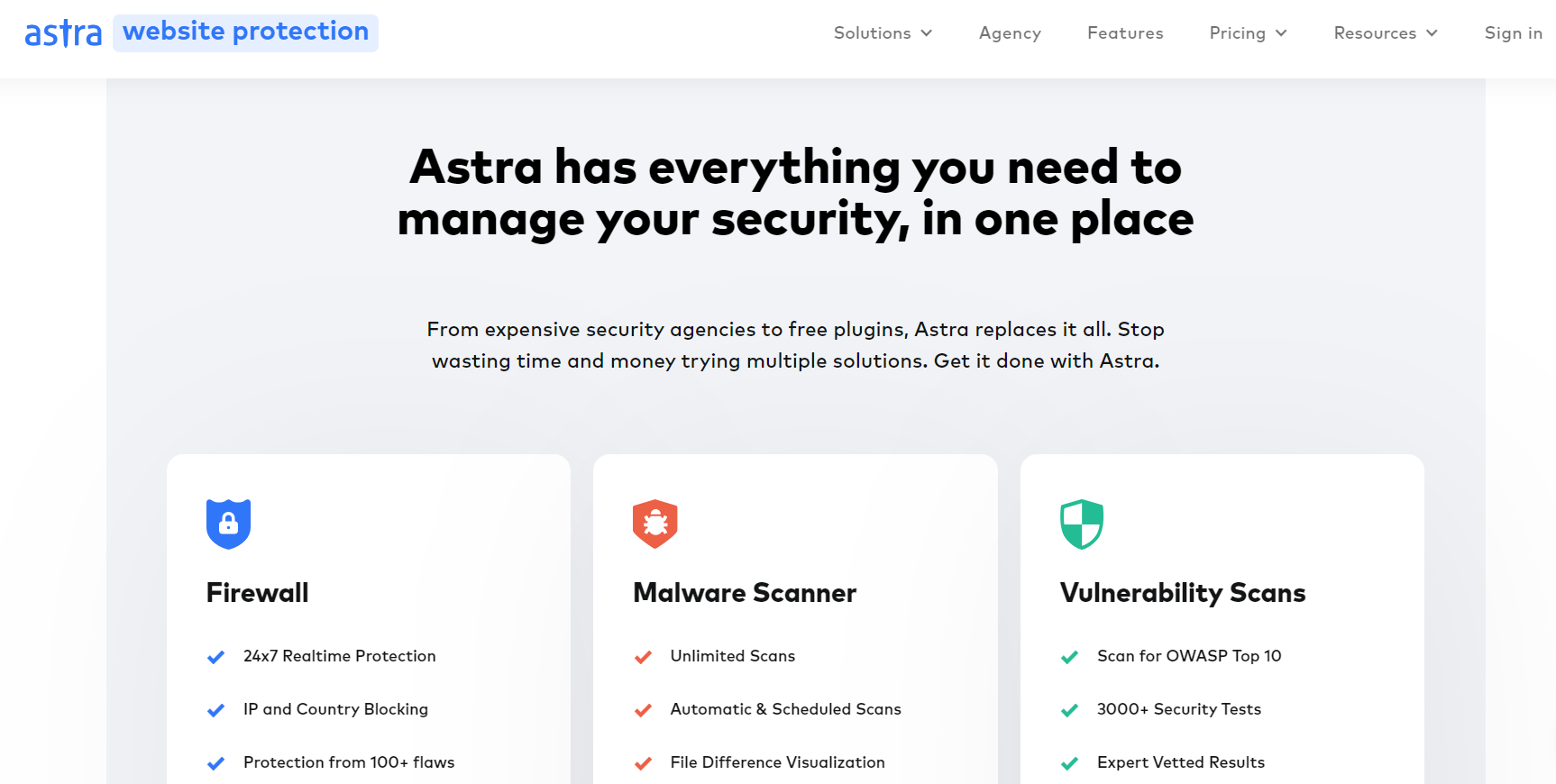
Astra Security’s firewall is a complete solution for protection from 100+ flaws available 24*7 in real-time.
Other features of Astra Firewall include:
IP and Country Blocking
Countries and IP addresses can be blocked or whitelisted and exception rules can be added to allow these parameters.
Blacklist Monitoring
60+ security engines are monitored to continuously check if your website’s been blocked due to security issues or vulnerabilities.
Spam-Blocking
Bots that create spam accounts or leave comments on websites are blocked with Astra Firewall.
Brute-Force Protection
Astra’s brute-force protection feature blocks repetitive brute-force attacks by malicious hackers.
VAPT
Astra also provides VAPT services for your existing firewalls to test the efficacy of the barrier by deploying 8,000+ test cases.
Integrations
Astra Firewall can be used in tandem with Cloudflare firewall since Astra solution provides a primary focus for CMS.
2. GCP Cloud Firewall
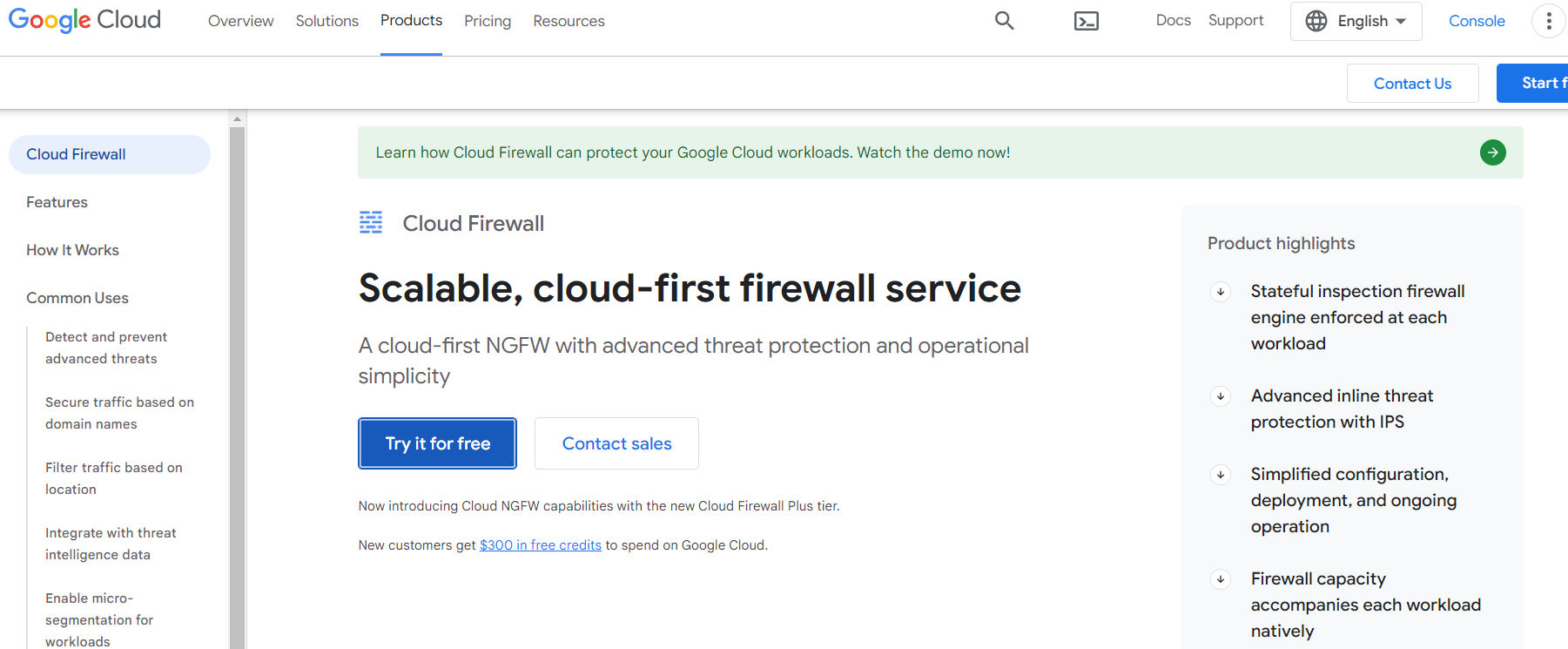
Cloud Firewall by GCP is a completely scalable, distributed service with total coverage, micro-segmentation, and features for advanced protection.
The firewall is easy to configure and deploy with its global default network policies that apply to all and can be defined at various levels i.e., organization, project, folder, etc.
Its advanced threat protection feature is led by a Palo Alto Networks-powered Intrusion Prevention System that works against various malware, spyware, and other modes of attacks.
Google Cloud Firewall is available in the following levels:
- Cloud Firewall Essentials: This is the base firewall service offered by Google. It comes with global and regional network firewall rules and IAM-governed tags for finer control over cloud assets.
- Cloud Firewall Standard: In addition to the essential firewall services, Google Firewall Standard provides threat intelligence to secure the network by filtering traffic based on data lists from the threat intelligence reports.
- Cloud Firewall Plus: The most advanced Google cloud firewall package, Firewall Plus comes with an advanced 7-layer security capacity including TLS (Transport Layer Security) & IPS (Intrusion Prevention Service).
3. Azure Cloud Firewall
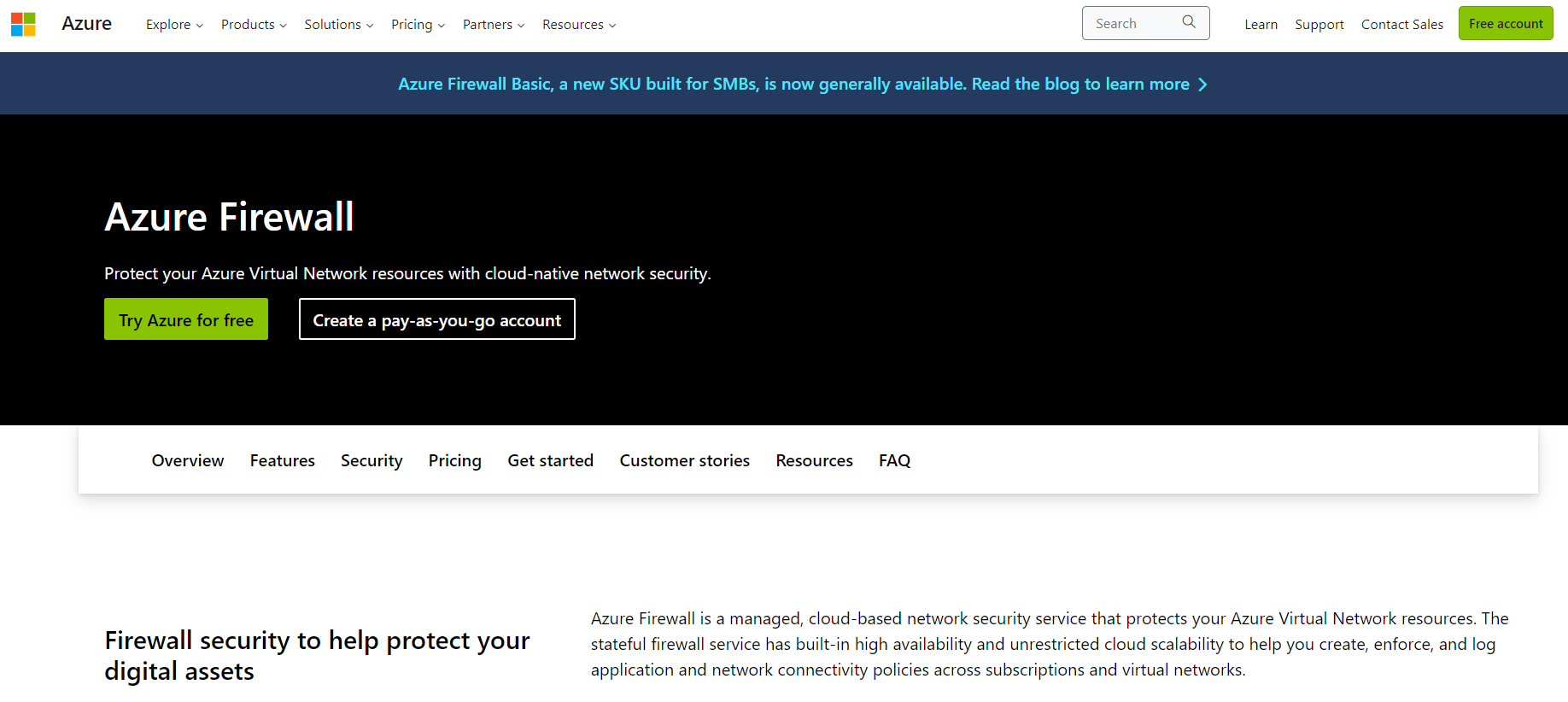
Azure firewall is a cloud-native security solution for Microsoft Azure cloud users that provides threat protection, high availability, and complete cloud scalability. It protects customers’ Azure Virtual Network resources.
The service also helps create, deploy, and log application and network policies for virtual networks. The firewall decrypts outbound traffic for security inspection before encrypting it for the destination.
Azure Firewall comes in three packages:
- Azure Firewall Basic: This is indicated for small and medium businesses and provides user configurations and threat intelligence.
- Azure Firewall Standard: The standard firewall provides network filtering, and real-time threat intelligence.
- Azure Firewall Premium: The premium version provides IDPS (Intrusion Detection and Prevention System), transport layer system inspection, URL filtering, and other services.
4. AWS Cloud Firewall
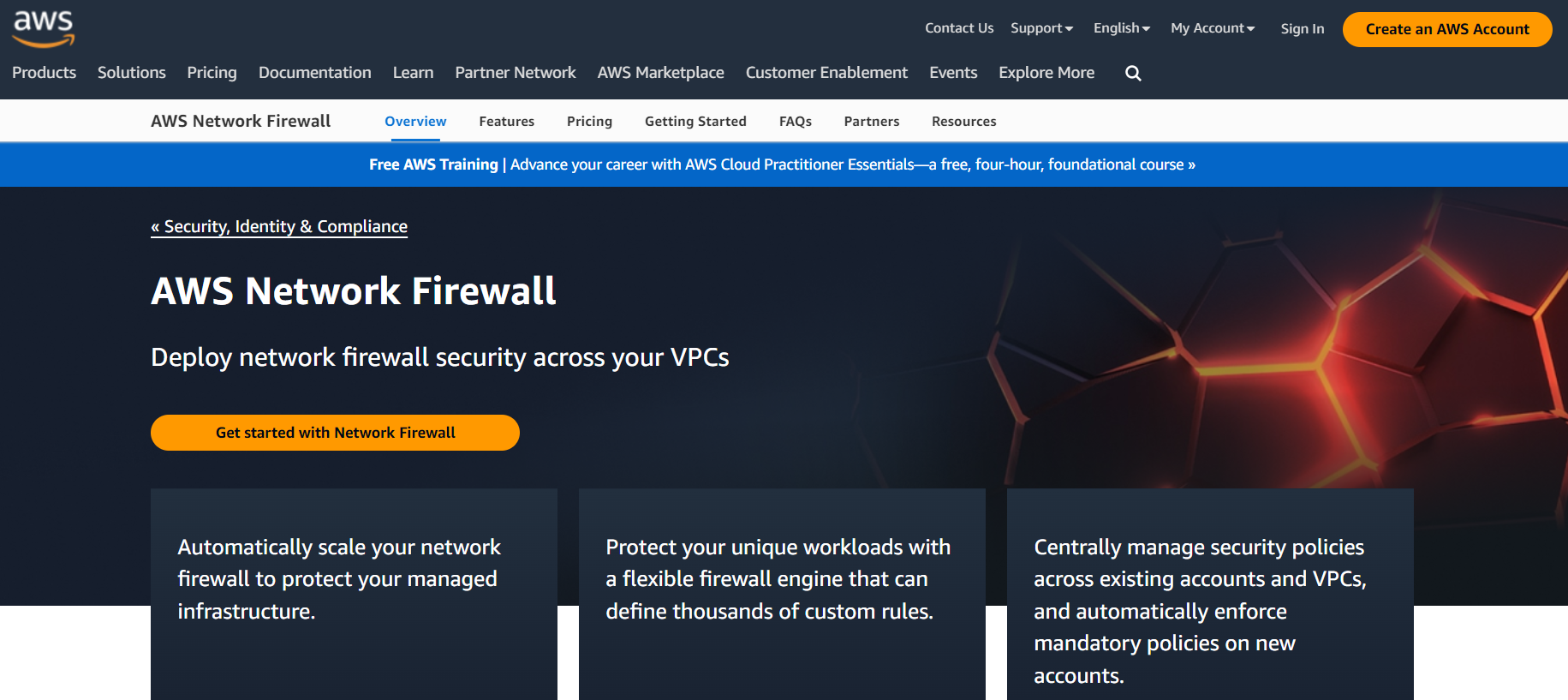
AWS Firewall is a cloud-based firewall provided by Amazon Web Services designed to protect web applications. The firewall and its security rules can be customized according to the needs of each organization.
Rules that are configured can be one’s own or companies can use pre-defined rules set by AWS. The solution is easy to use and comes as a part of the AWS subscription for cloud computing.
The WAF comes with API which lets customers customize their firewall rules from creation to deployment. AWS WAF allows users to pay only for the rules used and according to the filtered traffic. If users do not manage any financial data and require fewer WAF rules, they can deploy a lower number of rules and pay less.
5. Cloudflare Firewall
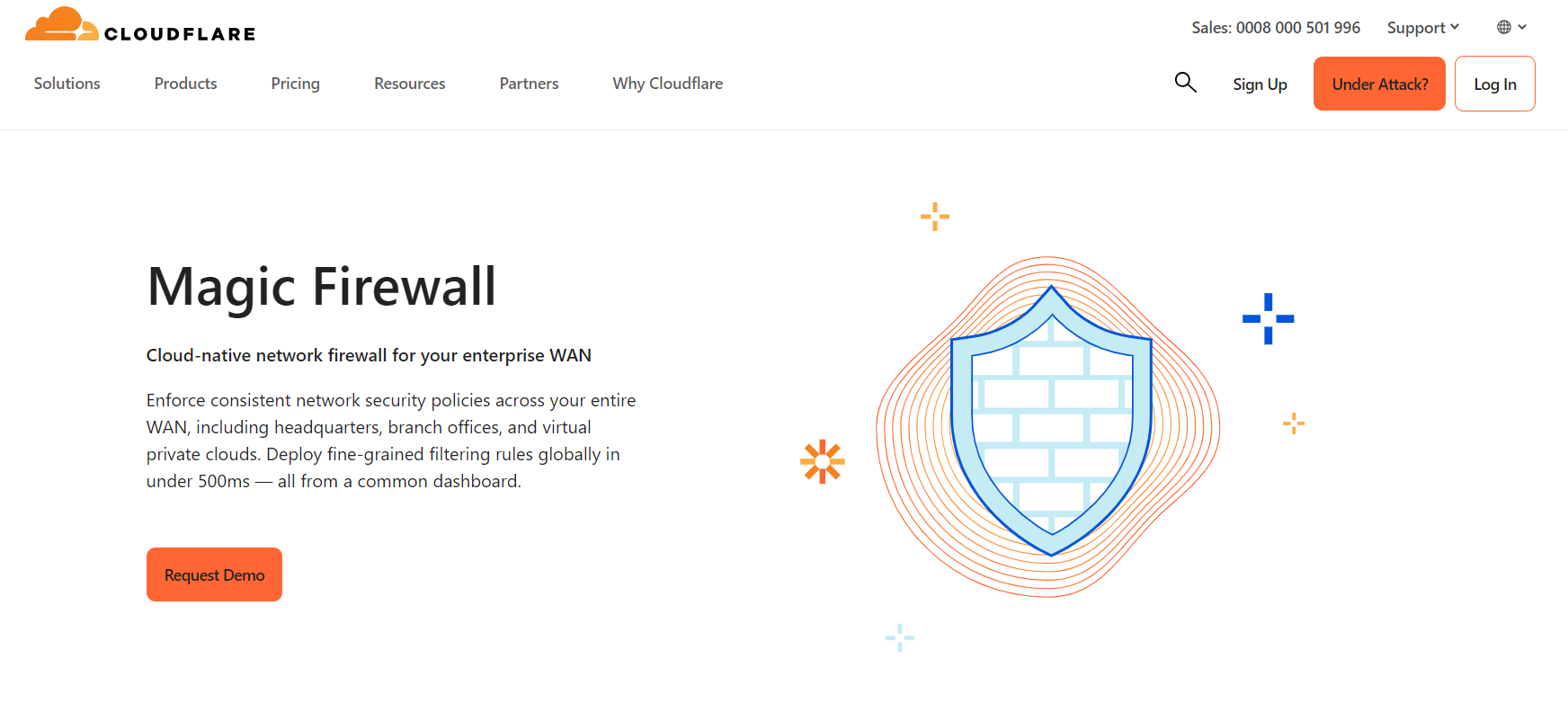
Cloudflare is currently one of the most well-known commercial firewall tools available. Besides firewalls, Cloudflare also provides internet security and DDoS mitigation.
Cloudflare WAF monitors the internet continuously for any new updates on attacks or vulnerabilities. Based on the predefined rules set by customers, Cloudflare WAF blocks threats and protects the network.
Cloudflare WAF is constantly updated with new features, ensuring its protection functions at all times. It is capable of preventing brute-force attacks and provides a content delivery network (CDN) for content to be stored and distributed across the vast Cloudflare network.
Cloudflare also provides SSL and TLS encryption, browser isolation, and corporate firewalls. Cloudflare WAF is an excellent choice for holistic protection owing to its features, however, its complex interface can be difficult to navigate.
Benefits of Implementing a Cloud Firewall
1. Provides Scalability
Companies often use cloud platforms for their scalability. Suffice it to say the same feature should be available for the applications used to protect the platform, i.e. cloud firewalls.
This in turn will ensure the smooth running of the customer applications on the cloud platform without the cloud security firewall acting as a bottleneck, slowing performance.
2. Increased Protection
Firewall is one of the more stringent cloud security management measures cloud platforms must have. It adds to the existing security by acting as a barrier and filtering external network traffic.
Since networks are also a part of the cloud service, SaaS firewalls for networks and the cloud go hand in hand. It plays a vital role in securing the processes of applications in the cloud.
3. Ease of Deployment
Unlike traditional firewalls, cloud-based firewalls are significantly easier to deploy and manage owing to their software quality.
Its initial setup and functioning cause very few disruptions in business operations and its network bandwidth is very scalable.
4. Ease of Integration
Cloud firewalls can be easily integrated with other security tools such as intrusion detection & prevention systems (IDS & IPS), anti-malware tools, & VAPT tools for added protection.
Good integration plays a huge role in maintaining seamless cloud security. Inconsistent integrations between various tools result in exploitable security gaps.
5. Automatic Updates
Cloud firewalls are updated automatically in real-time which means the barrier works against even the latest threats.
The SaaS firewall model for the cloud ensures firewall updates are systematic, automated, and do not obstruct application functionality.
Disadvantages of Cloud Firewalls
- Blind scanning of data packets can result in cheating by replication of firewall rules in a way designed to benefit the attacker’s entry into the cloud platform.
- Firewalls in the cloud lack a thorough understanding of website functioning, authenticated, and what the required permissions are.
- Generic firewall rules may result in failure to detect software-specific vulnerabilities.
- Functioning issues in the firewall service provider end can result in a firewall outage which can affect the working of the cloud platform as well.
Conclusion
Clouds are platforms that are constantly being upgraded & improved to bring the latest best features for customers. Deploying security for such platforms can be a time-consuming task if not automated & that’s where firewalls play a vital role.
Cloud firewalls provide traffic analysis, packet filtering, IDPS, threat intelligence, & access management services to secure your cloud assets. The top cloud firewall choices are AWS, GCP, & Azure firewalls for their own clouds while the best among the commercial tools are Astra Firewall and Cloudflare WAF.
Choose among the best cloud firewalls to safeguard your cloud platform and its various customer assets today.
FAQs
What are some examples of cloud firewalls?
Best examples of cloud firewalls are GCP Firewall, Azure Firewall, and AWS firewall, which are provided by the cloud platform providers themselves to be deployed by cloud customers based on their security needs. The firewall security rules can be customized to increase or reduce its number.
What are the differences between physical and cloud firewalls?
Cloud firewalls are strictly software-based and hosted in the cloud platform whereas traditional physical firewalls use hardware and software in the physical environment to secure one’s network.
What is a cloud-native firewall?
Cloud-native firewalls are firewalls that are specifically designed to protect cloud platforms from external threats by protecting the cloud clusters from outside and securing connections between different cloud components like containers.
















